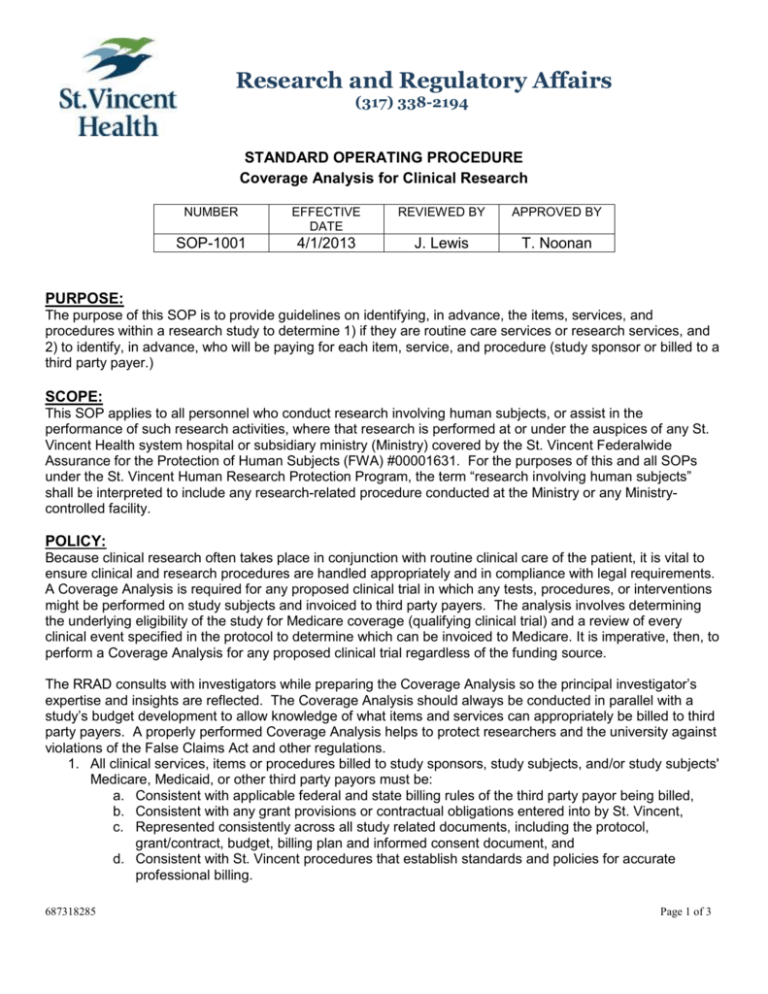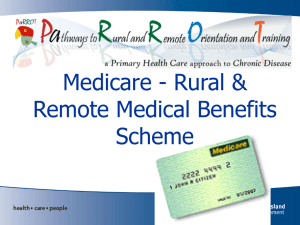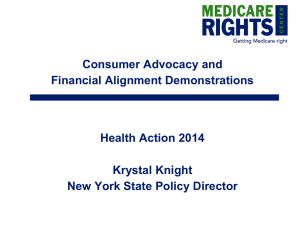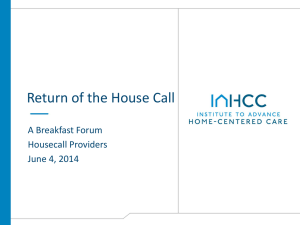Clinical Research Coverage Analysis SOP
advertisement

) Research and Regulatory Affairs (317) 338-2194 STANDARD OPERATING PROCEDURE Coverage Analysis for Clinical Research NUMBER EFFECTIVE DATE REVIEWED BY APPROVED BY SOP-1001 4/1/2013 J. Lewis T. Noonan PURPOSE: The purpose of this SOP is to provide guidelines on identifying, in advance, the items, services, and procedures within a research study to determine 1) if they are routine care services or research services, and 2) to identify, in advance, who will be paying for each item, service, and procedure (study sponsor or billed to a third party payer.) SCOPE: This SOP applies to all personnel who conduct research involving human subjects, or assist in the performance of such research activities, where that research is performed at or under the auspices of any St. Vincent Health system hospital or subsidiary ministry (Ministry) covered by the St. Vincent Federalwide Assurance for the Protection of Human Subjects (FWA) #00001631. For the purposes of this and all SOPs under the St. Vincent Human Research Protection Program, the term “research involving human subjects” shall be interpreted to include any research-related procedure conducted at the Ministry or any Ministrycontrolled facility. POLICY: Because clinical research often takes place in conjunction with routine clinical care of the patient, it is vital to ensure clinical and research procedures are handled appropriately and in compliance with legal requirements. A Coverage Analysis is required for any proposed clinical trial in which any tests, procedures, or interventions might be performed on study subjects and invoiced to third party payers. The analysis involves determining the underlying eligibility of the study for Medicare coverage (qualifying clinical trial) and a review of every clinical event specified in the protocol to determine which can be invoiced to Medicare. It is imperative, then, to perform a Coverage Analysis for any proposed clinical trial regardless of the funding source. The RRAD consults with investigators while preparing the Coverage Analysis so the principal investigator’s expertise and insights are reflected. The Coverage Analysis should always be conducted in parallel with a study’s budget development to allow knowledge of what items and services can appropriately be billed to third party payers. A properly performed Coverage Analysis helps to protect researchers and the university against violations of the False Claims Act and other regulations. 1. All clinical services, items or procedures billed to study sponsors, study subjects, and/or study subjects' Medicare, Medicaid, or other third party payors must be: a. Consistent with applicable federal and state billing rules of the third party payor being billed, b. Consistent with any grant provisions or contractual obligations entered into by St. Vincent, c. Represented consistently across all study related documents, including the protocol, grant/contract, budget, billing plan and informed consent document, and d. Consistent with St. Vincent procedures that establish standards and policies for accurate professional billing. 687318285 Page 1 of 3 2. Cost to the study subject or subject's third party payor associated with participating in the research study will be clearly disclosed in the Informed Consent Document signed by the study subject. 3. Each research study that includes clinical services, items or procedures provided in a clinical research study will be conducted pursuant to a documented billing plan that serves as a guide for appropriately directing and coding charges to the study account, the study subject or a third party payor. RESPONSIBLE PARTIES: The Principal Investigator of a clinical research study and the staff of the St. Vincent Research and Regulatory Affairs Department are jointly responsible for ensuring that these procedures are carried out. PROCEDURE: DETERMINATION of ROUTINE CARE SERVICES and RESEARCH SERVICES Before study coverage analysis can occur, the Principal Investigator (PI) must complete the WORKSHEET: Schedule of Events (WRK-9001). The PI’s completion of this Worksheet will generally be done with support from his/her study team members and, as needed, advice and guidance from the RRAD Research Billing Compliance team. This Worksheet is used to identify items and services within the research study, which are considered by the PI, in good faith, to be either routine care services or research services. The information on the Worksheet provides the basis for study coverage analysis, and provides documentation to support third party billing of routine or research related services by St. Vincent Health. Once the PI completes and attests to the Worksheet, the completed form and all related documents (final protocol, draft informed consent, draft contract, draft budget) should be submitted to the RRAD using FORM: Clinical Research Study Intake Form (FRM-100). The RRAD cannot begin the Coverage Analysis until the signed WORKSHEET: Schedule of Events (WRK-9001), and related documents, is received. COVERAGE ANALYSIS 1. The RRAD reviews the WORKSHEET: Schedule of Events (WRK-9001) with the PI or Research Coordinator (RC) for accuracy. Items reviewed include, study arms, services, procedures, and total number of occurrences across study duration/arm. The PI verifies any changes to the worksheet in writing. 2. The RRAD uses the Worksheet, and all related documents, to determine if the study is a Medicare Qualifying Trial. If a qualifying trial, then routine care services are billable to Medicare for reimbursement. If not a qualifying trial, routine care services are not billable to Medicare. 3. The RRAD reviews the study documentation to determine if the study has a National Coverage Decision (NCD). If a NCD exists, the NCD will identify what particular items or services Medicare will cover, or not cover. The NCD will describe the clinical circumstances and settings under which an item or services will be considered reasonable and necessary, or that an investigational item or service will be covered in the context of a clinical trial. (see end of policy for existing clinical trial NCDs) 4. The RRAD reviews the study sponsor’s proposed study budget to determine which items, services, and procedures the sponsor has agreed to pay for in the study. The RRAD must ensure that there is a payer identified for all research services and all routine care services. Coverage analysis is not complete until there is a payer for all study services. 5. For device studies, the RRAD reviews the study documentation to determine if it is necessary to seek permission to bill for the device and/or routine care services surrounding the device. If applicable, the RRAD will submit the required documents to obtain billing permission from Medicare and/or third party payers for the study device and/or surrounding services. 6. Coverage analysis for every study is different and is dependent upon the following: The protocol’s schedule of events 687318285 Page 2 of 3 A determination of what funding is available for the study and what specific items and services are paid for by external funds (sponsor, government grant or contract, foundation) Whether the external funds provided are adequate to cover study costs Whether the trial is “qualified” under the Medicare National Coverage Decision If the trial involves an IDE device in Category A or B, and meets the requirements for Medicare coverage of those device trials Regarding every item and service in the protocol’s schedule of events not paid for by the sponsor or other source of research funding, whether the service or items is research driven or routine care If necessary pre-approvals, notifications, and certifications have been obtained from Medicare, private carriers and the FDA If known non billable/non reimbursable items are identified during the coverage analysis, items to be discussed with study sponsor and/or institution to determine coverage 7. The coverage analysis must integrate Medicare rules with the compensation arrangements of the sponsorship agreement (if there is one) and the financial discussion in the study informed consent. There is also the need to factor commercial payers and Medicaid in the mix. 8. Coverage analysis is extremely important and accomplishes the following: It determines what the sponsor will cover (either provide free of charge or pay for) It determines if the item or service can be billed to Medicare or other third party payers It determines how the budget will be developed and negotiated It provides notice up front of what costs the subject will incur and allows the Investigator to modify the informed consent documents to include subject costs 9. NCD information to consider during coverage analysis: ▪ Medicare may grant NCDs on a study-by-study basis. As part of the coverage analysis process, the RRAD always determines whether a NCD exists. REFERENCES: 21 CFR 405.201 Medicare Clinical Trial Policies (accessible at: http://www.cms.hhs.gov/ClinicalTrialPolicies/) National Coverage Decision for Routine Costs in Clinical Trials (“NCD”) Manual 310.1 Version 2 effective July 9, 2007; CMS Publication 100-3 (accessible at: http://www.cms.hhs.gov/mcd/viewncd.asp?ncdid=310.1&ncdversion=2&basket=ncd%3A310%2E1%3A2%3AR outine+Costs+in+Clinical+Trials) MLN Matters Number SE0822 Clarification of Medicare Payment for Routine Costs in the Clinical Trial, (accessible at: http://www.cms.hhs.gov/MLNMattersArticles/downloads/SE0822.pdf) REVISION HISTORY: Date Revised Reason For Change Revised By 1/14/2014 Updated St.Vincent logo T.Noonan 687318285 Page 3 of 3





